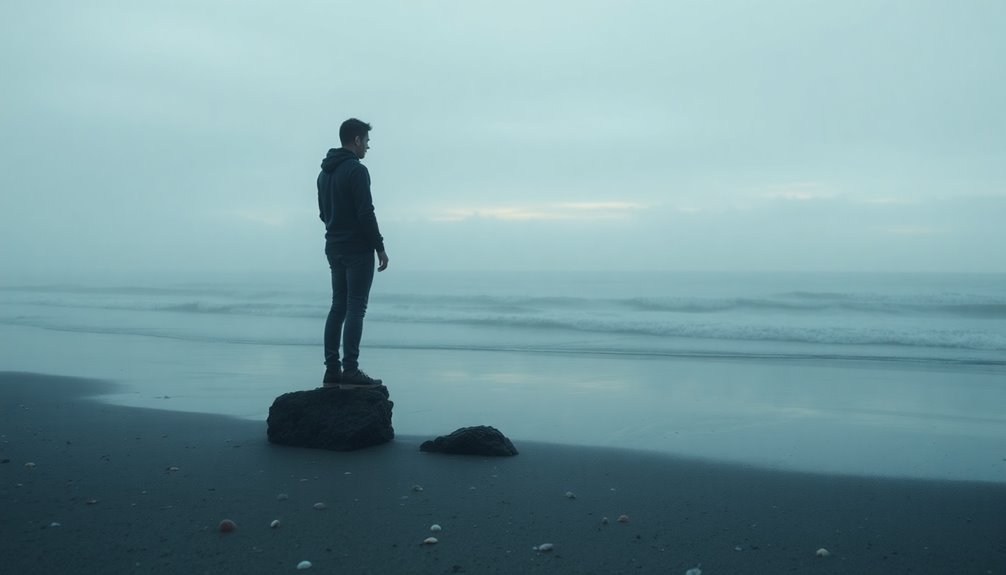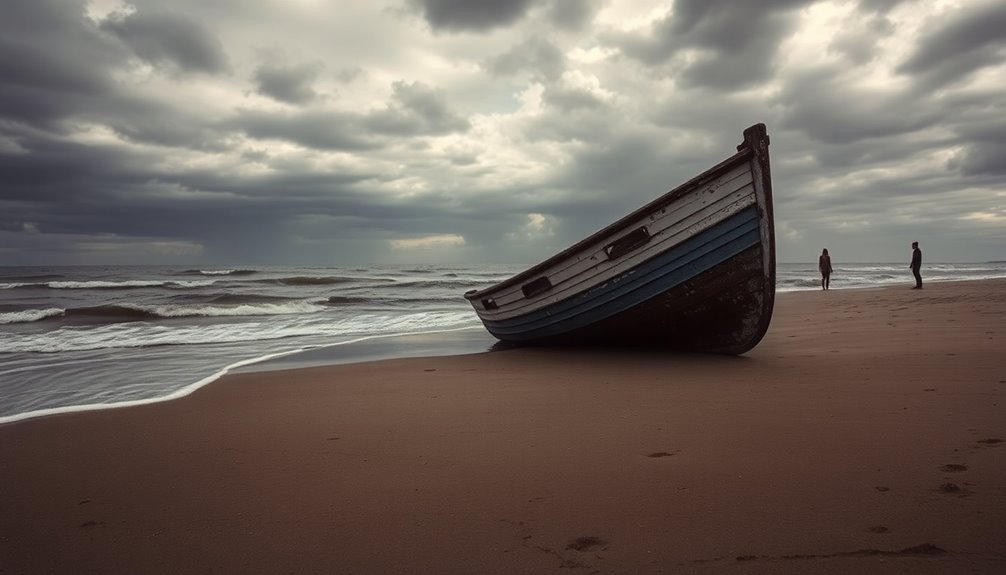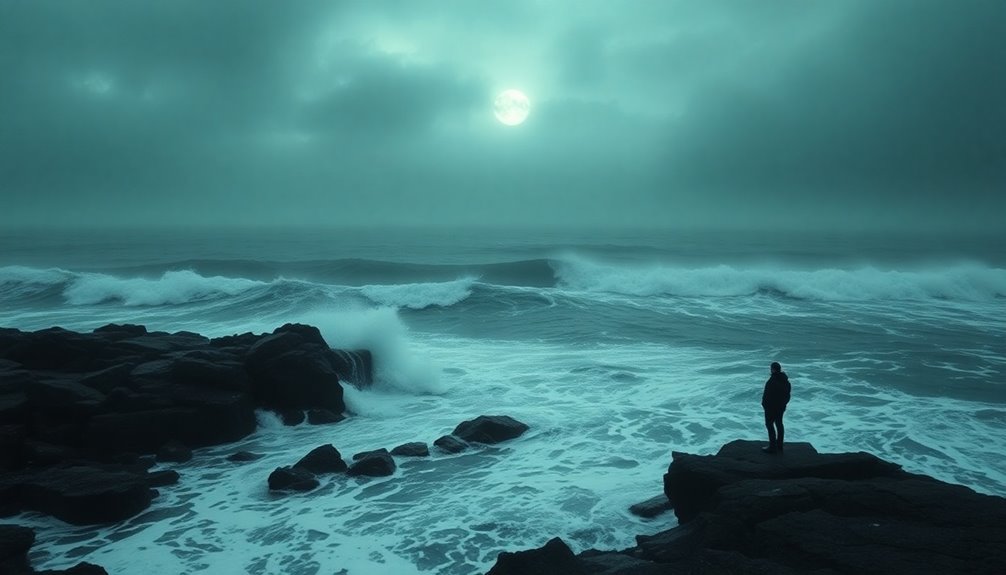In John Banville's "The Sea," you experience a haunting reflection on loss through Max Morden, an art critic reeling from his wife Anna's death. The nonlinear narrative invites you to explore grief intertwined with memory as Max revisits a seaside town, The Cedars. You'll feel the ocean's powerful symbolism, representing both beauty and the pain of impermanence. Banville's lush prose and vivid imagery draw you into Max's emotional turmoil, while his introspective character grapples with nostalgia and identity. If you stay with the story, you'll uncover deeper layers of grief and the transformative power of memory.
Overview of The Sea

John Banville's novel "The Sea," published in 2005, is a poignant exploration of grief and memory that earned the prestigious Man Booker Prize. You meet Max Morden, an art critic, who returns to a seaside town following the death of his wife, Anna. This haunting narrative takes you through the beauty of the coastal setting while diving deep into Max's identity and emotional turmoil. The story captures the essence of true love and the fragility of life, paralleling themes found in John Green's works.
Set mainly in a location called The Cedars, the novel intricately weaves Max's childhood memories and his relationships with the Grace family, especially the twins, Chloe and Myles. Banville employs a nonlinear narrative structure that invites you to piece together Max's experiences and feelings, offering a nuanced understanding of his grief. The process of navigating grief showcases the transformative power of personal experiences in shaping one's identity.
Through lyrical prose, Banville captures the intricacies of human relationships and the impact of loss, making the story resonate on multiple levels. You'll find yourself reflecting on how memory shapes identity and the enduring influence of the past. The themes of healing and empowerment in the face of loss highlight the transformative power of grief and recovery.
"The Sea" stands as a significant work in contemporary literary fiction, showcasing Banville's ability to evoke powerful emotions while exploring the complexities of life and love.
Themes of Grief and Memory
Max Morden's journey through grief in "The Sea" reveals how deeply intertwined memory and loss can be. As you follow Max grappling with the profound grief from his wife Anna's death, you see how loss permeates every corner of his life. The narrative emphasizes a "second death," illustrating how memories of loved ones can fade, highlighting the fragility of memory against the backdrop of mortality. Moreover, the exploration of memory's impact reflects the complex nature of human experiences, as Max confronts the essence of his past. In the context of generational poverty, characters often face similar struggles with memory and loss, showcasing the universal nature of these themes.
Max's reflections on childhood experiences with the Grace family serve as a means to process his grief, uncovering the complexities of love and loss. Through his nostalgia, you witness how past experiences shape his identity and emotional landscape. Banville's lyrical prose captures this interplay beautifully, drawing you into the depths of Max's sorrow.
The sea acts as a powerful metaphor, symbolizing the vastness of grief and the relentless passage of time. It embodies both the beauty of cherished memories and the inevitable pain of their loss. In exploring this emotional journey, the narrative echoes themes of resilience amidst adversity, illustrating how individuals navigate the darkness of their experiences.
In traversing these themes, you're left pondering the connections between grief and memory, and how they define not just Max's journey, but your understanding of love, loss, and the enduring impact of the past.
Narrative Structure and Style

In "The Sea," the nonlinear narrative structure intricately weaves together present-day grief with childhood memories, immersing you in Max Morden's emotional landscape. This first-person perspective allows you to experience Max's complex emotions surrounding loss and memory intimately.
As you navigate through the shifting timelines, you find yourself piecing together his life, revealing how past experiences shape his present. The use of symbolism in literature enriches the narrative, allowing for deeper exploration of Max's emotional turmoil. Additionally, Banville's work reflects the resilience of the human spirit, a theme that echoes throughout literary history, revealing how characters confront and grow from their struggles.
Banville's lush, painterly descriptions create vivid imagery that contrasts sharply with Max's often verbose and bombastic style. This juxtaposition further emphasizes the weight of his grief, as you see the beauty of the seaside setting juxtaposed with the turmoil within him.
The use of an unreliable narrator complicates your understanding, prompting you to question Max's recollections and self-perception throughout the narrative.
This rich narrative structure encourages deeper engagement, suggesting that a second reading may uncover hidden layers of meaning and character development.
As you revisit the text, you might discover new insights into Max's psyche and the nuances of his reflections on loss and memory that you may have initially overlooked. Furthermore, the themes of civilization vs. savagery explored in literature resonate with Max's struggle as he navigates the complexities of human nature in the face of grief.
Character Analysis of Max Morden
The complex narrative structure of "The Sea" sets the stage for exploring Max Morden's character, revealing the layers of his psyche shaped by grief and memory. As a middle-aged art critic, you see Max as a deeply introspective figure grappling with the profound loss of his wife, Anna. His grief manifests in a hypersensitive nature, often leading to cruelty in his interactions, particularly with animals. This contradiction highlights the complexity of his character. Furthermore, like Bigger Thomas, Max is shaped by the dehumanizing effects of racism that permeate societal interactions in his world. The healing and renewal found in nature serves as a contrasting theme that underscores Max's emotional turmoil.
Max's relationship with Anna lacked the intimacy he craved, leaving him feeling inadequate and alone after her death. This void drives him to seek solace in nostalgia, particularly in his memories of the Grace family, especially the twins, Chloe and Myles. Their presence becomes a pivotal part of his coming-of-age journey, emphasizing themes of first love and loss.
Throughout the narrative, Max's reflections reveal his struggle with identity and the longing for deeper human connections. You witness how his past experiences shape his understanding of love and loss, offering a haunting exploration of what it means to navigate the intricacies of memory and the human condition. The theme of hope and despair resonates throughout Max's journey, mirroring the resilience and inner strength found in other literary works.
The Symbolism of the Sea

Amidst the backdrop of "The Sea," the ocean becomes a powerful symbol that encapsulates the intricate dance between beauty and peril in life's journey. For Max Morden, the sea serves as a reflection of his emotional currents, intertwining nostalgia and loss.
The idyllic setting of The Cedars, a seaside retreat, contrasts sharply with the darker realities of grief, reinforcing the duality of the sea as both a sanctuary and a source of turmoil. The stories of immortal jellyfish in nature reflect resilience, much like Max's struggle with his own memories. This exploration of family unity in times of hardship mirrors the Joad family's journey in Steinbeck's classic.
Banville's rich sensory imagery evokes the beauty of the sea while also highlighting its unpredictability, mirroring Max's memories of his deceased wife, Anna. As he navigates the passage of time, the sea symbolizes how memories can fade yet remain deeply ingrained in his consciousness.
This vastness emphasizes the fragility of human existence, reminding you that life is transient, much like the waves that wash ashore. Moreover, the exploration of themes of betrayal in historical narratives, such as in "The Lost Apothecary," resonates with Max's journey through loss and remembrance.
Ultimately, the symbolism of the sea in Banville's narrative illustrates the complexities of love and loss, offering profound insights into how the past shapes identities. In this way, the ocean becomes a poignant reminder of the emotional landscape we all traverse.
Literary Techniques and Influences
John Banville masterfully employs a lush and painterly writing style in "The Sea," immersing you in vivid imagery and complex sentence structures that evoke deep emotional resonance. His non-linear narrative invites you to navigate the intricacies of memory and identity, revealing how these elements shape your understanding of truth.
Through the lens of the unreliable narrator, Max Morden, you're encouraged to question the reliability of recollections, enhancing your engagement with the text.
Banville's philosophical themes resonate deeply, reminiscent of Proust, Faulkner, and Nabokov, who also explore human emotion and the weight of nostalgia. The symbolism of the sea serves as a powerful motif, embodying both the beauty and danger of life's experiences while reflecting the passage of time.
As you journey through the narrative, you'll find yourself pondering the bittersweet nature of coming-of-age, akin to L.P. Hartley's "The Go-Between."
Banville's lyrical prose, coupled with existential reflections, invites you to confront your own memories and identities, making "The Sea" not only a story of loss but also a profound meditation on the human experience.
Critical Reception and Impact

With its win of the 2005 Man Booker Prize, "The Sea" catapulted John Banville into the spotlight of contemporary literature, marking a significant moment in his career. The novel's critical reception showcased a mix of admiration and contention, drawing attention for its unique style and depth.
Here are three key aspects of its impact:
- Lyrical Quality: Critics praised Banville's prose for its poetic beauty.
- Emotional Depth: Readers connected deeply with the themes of loss and memory.
- Philosophical Musings: The narrative offers profound reflections on human experiences.
Despite these strengths, "The Sea" received mixed reviews, achieving an average rating of 3.54 from over 32,000 ratings. Some readers appreciated Banville's intricate storytelling and thematic resonance, particularly in its exploration of youth and bittersweet moments, reminiscent of L.P. Hartley's "The Go-Between."
However, others struggled with its non-traditional structure and complex narrative.
Banville's work continues to spark discussions about the boundaries of literature, cementing "The Sea" as a significant contribution to the literary landscape and solidifying his reputation as a masterful writer.
Sensory Imagery in Banville's Writing
In "The Sea," you'll notice how Banville uses evocative descriptions of nature to pull you into Max Morden's world.
The smells of the salty air and the sounds of the waves serve as powerful memory triggers, connecting you to his past.
This sensory imagery not only paints a vivid picture but also deepens the emotional resonance of his journey through grief.
Evocative Descriptions of Nature
Often, Banville's prose immerses you in the sensory richness of nature, transforming the seaside into a vivid backdrop for the protagonist Max Morden's journey. His evocative descriptions create a tapestry of emotions that resonates deeply with your own experiences of beauty and loss.
Consider how he masterfully employs sensory imagery:
- Touch – You feel the coarse sand beneath your feet and the chill of the sea breeze against your skin.
- Sound – The rhythmic crashing of waves mirrors Max's turbulent thoughts, pulling you into his emotional landscape.
- Sight – You visualize the stark contrast between the serene blue of the ocean and the ominous grey clouds, symbolizing both beauty and danger.
Banville's lush language not only enhances the narrative but also evokes nostalgia, intertwining nature with Max's memories. The salty air serves as a powerful reminder of his past, intensifying the feelings of grief that permeate his reflections.
Each image captures the complexities of human emotions, revealing how the natural world acts as a canvas for personal experiences of loss, inviting you to explore the depths of your own memories.
Memory Triggers Through Smells
The sensory richness of Banville's prose extends beyond visual and tactile imagery to encompass the powerful domain of smell. In "The Sea," you'll notice how specific fragrances can evoke vivid memories, transporting Max Morden back to his childhood and his time with his late wife, Anna.
As he encounters the smell of the sea or the fragrance of blooming flowers, these scents serve as emotional triggers, illuminating the depths of his nostalgia and grief.
Each olfactory detail acts as a catalyst for recollections that are both comforting and haunting. You can almost feel how the scent of saltwater brings forth a rush of memories, blending joy and sorrow in a complex tapestry of loss.
Banville's lush descriptions immerse you in this sensory world, making you acutely aware of how smells intertwine with emotional experiences.
Through Max's journey, you witness how these memory triggers reflect the psychological intricacies of grief. The interplay of smell and memory becomes a poignant exploration of longing, reminding you that our past is often just a fragrance away, waiting to beckon us back into the depths of our emotions.
Emotional Resonance of Sound
John Banville masterfully weaves sound imagery throughout "The Sea," allowing readers to experience the profound emotional landscape of Max Morden's journey. The auditory elements he employs evoke a rich tapestry of feelings, heightened by:
- The rhythmic crashing of waves, symbolizing the ebb and flow of grief.
- The haunting whispers of the wind, echoing Max's nostalgic reflections.
- The piercing silence that follows moments of loss, amplifying emotional weight.
As you immerse yourself in the narrative, the sound of the sea becomes a constant companion, embodying the interplay between memory and loss. Each auditory detail enhances your understanding of Max's internal struggles.
Banville's descriptions of laughter echoing in the past contrast sharply with the oppressive silence that envelops him after loss, illustrating the duality of joy and sorrow in his memories.
The resonance of sound and silence reinforces the transient nature of life. While the sounds of the seaside offer moments of comfort, they also serve as a reminder of torment, mirroring Max's journey through grief and nostalgia.
This emotional resonance of sound deepens your connection to Banville's haunting exploration of loss.
Philosophical Reflections on Loss

While grappling with grief, many find that loss shapes their identity in profound ways, intertwining memory and mourning. In "The Sea," Max Morden's reflections reveal how grief acts as a lens through which you examine your own existence. The novel introduces the idea of a "second death," suggesting that as memories fade, you confront an existential realization of what it truly means to lose someone.
This journey highlights the struggle you face in articulating complex emotions, as the inadequacies of memory often deepen your sense of loss.
Banville's lyrical prose beautifully captures the duality of life, where the sea symbolizes both beauty and danger. As you navigate through your grief, you recognize that the connections forged in life, though impermanent, provide essential meaning.
Each reflection becomes a demonstration of the transient nature of existence, urging you to embrace the richness of your experiences. Ultimately, "The Sea" invites you to explore how mourning reshapes your identity, allowing the echoes of loss to resonate within your life, imbuing it with depth and purpose despite the ache of impermanence.
Conclusion
In John Banville's "The Sea," you're left contemplating the profound depths of grief and memory. With over 70% of the Earth's surface covered by water, the sea becomes a powerful symbol of both loss and renewal. As Max Morden navigates his past, you can't help but feel the weight of his experiences, reflecting your own encounters with sorrow. Ultimately, Banville's haunting prose invites you to embrace the complexities of life, love, and the unforgiving passage of time.



